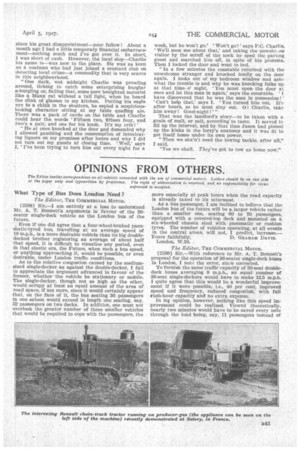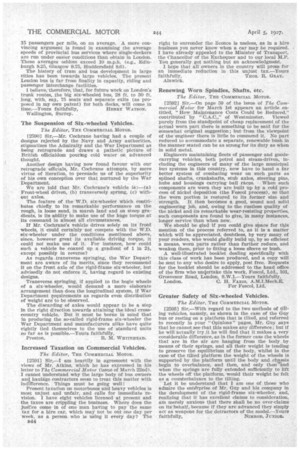OPINIONS FROM OTHERS.
Page 61

Page 62

If you've noticed an error in this article please click here to report it so we can fix it.
The Editor invites correspondence on all subjects connected with the use of commercial motors. Letters should be on one side of the paper only and typewritten by preference. The right of abbreviation is reserved, and no responsibility for views expressed is accepted,
What Type of ,Bus Does London Need ?
The Editor, THE COMMERCIAL MOTOR.
[2588] Sir,—I am entirely at a loss to understand Mr. A. T. Bennett's arguments in favour of the 36seater single-deck vehicle as the London bus of the future.
Even if one did agree that a four-wheel-braked pneumatic-tyred bus, travelling at an average speed of 18 m.p.h., is a more desirable vehicle than its big doubledecked brother registering an average of about half that speed, it is difficult to visualize any period, even in that elastic era, the Future, when such a bus speed, or anything approaching it, would be possible, or even desirable, under London traffic conditions.
As to the relative congestion caused by the mediumsized single-decker as against the double-decker, I fail to appreciate the argument advanced in favour of the former, whether the vehicle be stationary or mobile. The single-decker, though not so high as the other, would ocCupy at least an equal amount of the area of road space, if not more, since it would certainly appear that, on the face of it, the bus seating 36 passengers in one saloon would exceed in length one seating, say, 52 passengers on two decks. In addition, one must not overlook the greater number of these smaller vehicles that would be required to cope with the passengers, the more especially at peak hours when the road capacity is already taxed to its uttermost.
As a bus passenger, I am inclined to believe that the London bus of the future will be a larger vehicle rather than a smaller one, seating 60 to 70 passengers, equipped with a covered-top deck and mounted on a six-wheeled chassis shod with pneumatic or cushion tyres. The number of vehicles operating, at all events in the central areas, will not, I predict, increase.— Yours faithfully, D. GRAHAM DAVIS. London, W.10. _ The Editor, THE COMMERCIAL MOTOR.
1-25891 Sir,—With reference to Mr. A. T. Bennett's proposal for the operation of 36-seater single-deck buses in London, I note the error, since corrected.
To furnish the same traffic capacity of 50-seat doubledeck buses averaging 9 m.p.h., an equal number of 36-seat single-deckers would have to make 12.5 m.p.h. I quite agree that this would be a wonderful improvement if it were possible, i.e. 40 per cent. improved speed and frequency, reduced congestion, with full rush-hour capacity and no extra expense.
In my opinion, however, nothing like this speed improvement could be realized. Viewed theoretically, nearly two minutes would have to be saved every mile through the load being, say, 11 passengers instead of 15 passengers per mile, on an average. A more convincing argument is found in examining the average speeds of provincial bus services where single-deckers are run under easier conditions than obtain in London. These averages seldom exceed 10 m.p.h. (e.g., Edinburgh 825, Glasgow 9.75, Huddersfield 8.6).
The history of tram and bus development in large cities has been towards large vehicles. The present London bus is far from finality in capacity, riding and passenger interchange facilities.
I believe, therefore, that, for future work on London's trunk routes, _the big six-wheeled bus, 28 ft. to 30 ft. long, with, say, 75 seats and separate exits (as proposed in my own patent) for both decks, will come in
time.—Yours faithfully, HExaY WATSON. Wallington, Surrey.
The Suspension of Six-wheeled Vehicles.
The Editor, TRE COMMERCIAL MOTOR.
125901 Sir,—Mr. Cochrane having had a couple of designs rejected by the Navy and Army authorities, stigmatizes the Admiralty and the War Department as being retrograde and draws a pathetic picture of British officialdom pouring cold water on advanced thought.
Another design having now found favour with our retrograde officials, Mr. Cochrane attempts, by mere virtue of iteration, to persuade us of the superiority of his own conception over that nurtured by the War Department.
We are told that Mr. Cochrane's vehicle is :—(a) Front-wheel driven, (b) transversely sprung, (c) without axles.
The feature of the W.D. six-wheeler Which contributes chiefly to its remarkable performance on the rough, in loose sand, in marsh land and on steep gradients, is its ability to make use of the huge torque at its command in almost an circumstances.
If Mr. Cochrane's vehicle drives solely on its front 'wheels, it cbuld certainly not compete with the W.D. six-wheeler under the conditions mentioned above, since, however great its available drivifig torque, it could not make use of it. For instance, how could such a vehicle be coaxed up a gradient of 1 in 21, except possibly in reverse?
As regards transverse springing, the War Department are aware of its merits, since they recommend it on the front axle of the rigid-frame six-wheeler, but advisedly do not enforce it, having regard to existing designs.
Transverse springing, if applied to the bogie wheels of a six-wheeler, would demand a more elaborate arrangement than does the longitudinal system, if War Department requirements as regards even distribution of weight are to be observed.
The discarding of axles would appear to he a step in the right direction towards attaining the ideal crosscountry vehicle. But it must be borne in mind that in producing the so-called rigid-frame six-wheeler the War Department and manufacturers alike have quite rightly tied themselves to the use of standard units so far as is possible—Yours faithfully, Preston. R. M. WHITEHEAD.
Increased Taxation on Commercial Vehicles.
The Editor, THE COMMERCIAL MOTOR.
[2591] Sir,—I am heartily in agreement with the views of Mr. Atkins, which he has expressed in his letter to The Commercial Motor (issue of March 22nd). I cannot understand why the large body of bus owners and haulage contractors seem to treat this matter with indifference. Things must be going well !
Present taxation on motorbuses and heavy vehicles is most unjust and unfair, and calls for immediate revision. I have eight vehicles licensed at present and the taxes are crippling the business. Where does the justice come in of one man having to pay the same tax for a hire ear, which may not be out one day per week, as a person who is using it every day? The
B44 right to surrender the licence is useless, as in a hire business you never know when a car may be required. I have already appealed to the Minister of Transport, the Chancellor of the Exchequer and to our local M.P. You generally get nothing but an acknowledgment.
I hope that all owners in the country will press for an immediate reduction in this unjust tax.—Yours faithfully, THOS. R. GRAY. Alnwick.
Renewing Worn Spindles, Shafts, etc.
The Editor, THE COMMERCIAL MOTOR.
[2592] Sir,—On page 59 of the issue of The Commercial Motor for March 1st appears an article entitled, "How Maintenance Costs Could be Reduced," contributed by " C.A.C.," of Westminster. Viewed purely from the standpoint of cheap replacement of the actual worn part there is something to be said for the somewhat original suggestion ; but from the viewpoint of the engineer there is little to commend it. No part reduced to accommodate a separate, renewable bush in the manner stated can be as strong for its duty as when in solid metal.
Engineers maintaining fleets of passenger and goodscarrying vehicles, both petrol and steam-driven, including the engineers of many of the large municipal bus systems in this country, now have to hand a far better system of combating wear on such part S as splined shafts, crankshafts, stub axles, steering pins, hubs and housings carrying ball races. When such components are worn they are built up by a cold process of nickel deposition (the Fescol process), so that the worn portion is restored to its former size and strength. It then becomes a good, sound and solid engineering job, and, owing to the rustless quality of the nickel and its remarkable wear-resisting properties, such components are found to give, in many instances, longer service than when new.
We should be glad if you could give space for this mention of the process referred to, as it is a matter which will be appreciated, doubtless, by very many of your readers, who would gladly build up, by so efficient a means, worn parts rather than further reduce, and weaken them, prior to fitting a loose sleeve or bush.
A well-illustrated booklet dealing specifically with this class of work has been produced, and a copy will be sent to any who desire to apply, post free. Requests for the booklet should be addressed to the head office of the firm who urelertake this work, Fescol, Ltd., 101, Grosvenor Road, London, S.W.1.—Yours faithfully,
London. C. H. Fetus, A.M.I.Mech.E.
For Fescol, Ltd.
Greater Safety of Six-wheeled Vehicles.
The Editor, THE COMMERCIAL MOTOR.
[2593] Sir,—With regard to the two methods of tilting vehicles, namely, as shown in the case of the Guy bus or resting on a platform that is tilted, and referred to recently in your "Opinions" pages, Mr. Guy says that he cannot see that this makes any difference; but if he will actually tryilt he will find that it makes a very considerable difference, as in the former case the wheels that are in the air are hanging from the body by means of their springs, and all their weight is tending to preserve the equilibrium of the body, whilst in the case of the tilted platform the weight of the wheels is supported by the platform until the body and chassis begin to overbalance, and then, and only theelnd when the springs are fully extended sufficiently to lift the wheels off the platform, would their weight be felt as a counterbalance to the tilting.
Let it be understand that I am one of those who admire the enterprise of Mr. Guy and his company in the development of the rigid-frame six-wheeler, and, realizing that it has excellent claims to consideration, am merely anxious that there shall be no over-claims on itsebehalf, because if they are advanced they simply net as weapons for the detractors of the model.—Yours faithfully, NIMROD, JUNIOR.






































































































